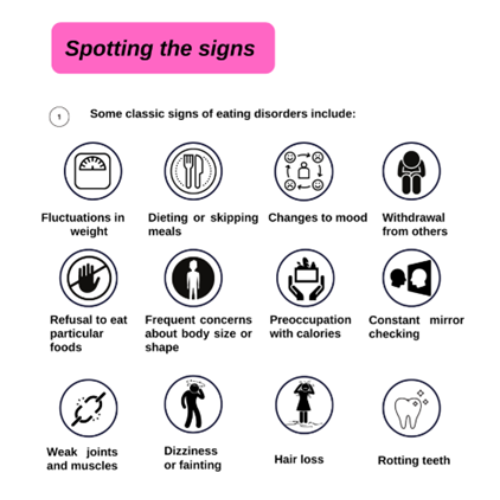Eating disorders

Written by:

Medically Reviewed by:
This Page was last reviewed and changed on May 7th, 2024
Eating disorders come in different forms, and nobody is immune from falling victim to such a devastating condition. An estimated 1.25 million people have an eating disorder in the UK, and when we think about just how many individuals go undiagnosed, the gravity of this situation becomes all too clear.

What is an eating disorder?
An eating disorder is a psychiatric condition characterised by particular behaviours relating to food and body image. All of us can become conscious of our food intake and appearance to a certain extent, but those with an eating disorder will resort to risky and unsafe means to combat these perceived problems with their appearance.
Much like other addictions, eating disorders can control all facets of a person’s life, draining them of energy and depriving them of all everything that was once important to them; until eventually, all that they have is left is their illness. There are several patterns of behaviour that make up an eating disorder, some of which include:
- Restricting food consumption
- Rapidly ingesting large quantities of food (bingeing)
- Getting rid of calories through vomiting, use of laxatives and other harmful behaviours (purging)
It is important to note that, while displaying any one of these behaviours is representative of an eating disorder, it is also common for individuals to exhibit a combination of these behaviours as well. For example, while those with anorexia will often restrict their food intake, it is not uncommon for them to develop symptoms present in bulimia (such as purging.) Therefore, there is no one-size-fits-all for eating disorders, and they will present themselves differently from person to person.
Classifications of eating disorders

It is useful to go into a little more detail about some common eating disorders to develop a deeper understanding of the condition and how they can crossover with one another.
Anorexia nervosa
Those who suffer from this condition will restrict and deprive themselves of food, sometimes to the point where they become dangerously ill. This condition is usually associated with intrusive thoughts about food and the sufferer’s own body. It is not uncommon for people with anorexia to undergo constant, relentless negative feelings about their body image. This will then manifest into an obsession with becoming thinner to keep these thoughts at bay.
Contrary to popular belief, anorexia is not always driven by beauty standards but can also stem from a desire to have control. Those with anorexia can also display traits present in disorders like OCD, or obsessive-compulsive personality disorder.
Bulimia nervosa
Those suffering from bulimia will eat large quantities of food in short intervals until they are well past the point of fullness. As a result of this extreme eating, the individual will respond by purging (self-induced vomiting) to expel the food and excess calories from their system. These cycles of bingeing and purging will be consistent in those with bulimia, with these behaviours appearing from once a week to as often as at every mealtime.
Binge eating disorder
Binge eating disorder (BED) involves individuals eating very large quantities of food over a short period of time. Unlike bulimia, those with BED will not resort to methods such as purging to expel the food from their bodies, but they might go through periods of fasting in between binges. Bingeing once every so often is not the same as BED, and these behaviours must regularly persist to constitute the illness.
Some triggers for BED include:
- Dieting
- Poor body image
- Feelings of anxiety or depression
- Low self-esteem
Signs of an eating disorder
Whether in yourself or a loved one, we understand just how heart-wrenching it can be to recognise you might be beginning to show signs of an eating disorder. However, it is through acceptance that we can finally begin the healing process. Therefore, if you feel that you recognise some of the below signs, either in yourself or someone else, this might indicate that they are suffering from an eating disorder and will require treatment to confront it.

- Fluctuation in weight
- Dieting or skipping meals
- Changes to mood
- Withdrawal from others
- Refusal to eat particular foods
- Frequent concerns about body size or shapes
- Preoccupation with calories
- Constant mirror checking
- Weak joints and muscles
- Dizziness or fainting
- Hair loss
- Rotting teeth
Is an eating disorder an addiction?

Eating disorders can be classified as behavioural addictions, otherwise known as process addictions, as they typically involve unhealthy patterns of behaviour which are both extreme and self-destructive. For example, someone suffering from alcohol addiction will drink to excess and to the point where it is beginning to have a negative effect on their mental and physical wellbeing. In much the same way, those with eating disorders will resort to extreme means to combat their issues with their weight, feeling unable to stop or control these dangerous behaviours.
Myths about eating disorders
Below, we have dissected some common myths and misconceptions about eating disorders.
MYTH. ‘Eating disorders are temporary and only affect young women.’
FACT. While eating disorders tend to be more prevalent in young women, they can happen to anyone and should never be ignored or avoided. To state that this condition is temporary and will go away on its own is to take away from the realities of this affliction and just how dangerous it can be when left untreated.
MYTH. ‘Eating disorders are just about food.’
FACT. Eating disorders are psychiatric conditions which involve far more than just food. While diet is definitely a component, it is far less simple to overcome than modifying eating habits or staying away from particular foods. This is because these disorders stem from circumstances which are out of the sufferer’s control, often manifesting in response to lived experiences, genetics, or psychological factors. For this reason, those with an eating disorder will need to engage in treatment to make a full recovery.
MYTH. ‘An eating disorder means you are underweight.’
FACT. While it is a common assumption that eating disorders always involve extreme weight loss, this is not the case. People of all shapes and sizes develop this addiction, and a person does not need to be underweight to suffer from an eating disorder. It is dangerous myths like these that often prevent people from engaging in treatment or seeking out a diagnosis in the first place.
Are eating disorders treatable?
For those entrenched in the grips of an eating disorder, suffering in silence can make the condition feel hopeless to contend with. However, we at Sanctuary Lodge would like to remind you that, with the right support, this condition can be overcome at rehab. In fact, for many individuals suffering from eating disorders, treatment is often the first opportunity they will have ever had to reflect upon their condition, assessing some of the unhealthy thought patterns or behaviours that might have led their harmful relationship with food to manifest. This is why treatment is such a valuable part of recovery, giving those suffering the tools they need to face their illness head-on.
It is important to tailor a programme of eating disorder treatment specific to every individual, as what works for one person will not necessarily work for another. Therefore, by creating a bespoke plan of care we lay the foundations for recovery, assessing the client’s needs before the journey to healing begins. Utilising a number of therapies with a trained counsellor to analyse the root causes of their eating disorder, exploring positive coping strategies and effective tools to implement should these dangerous thoughts or behaviours return in the future. Some therapies that are proven to be effective in treating eating disorders include:
- Cognitive Behavioural Therapy (CBT)
- Individual and Group Therapy
- Family Therapy
It is also essential that medical professionals organise a physical assessment beforehand, to ensure that the client is in good health before they start therapy.
Let us help you
Trying to support yourself or someone you love in navigating such a complicated and misunderstood condition as an eating disorder can be immensely challenging without the right help, but it is by putting your trust in the experts that you can begin to relinquish control and get your life back. With time-tested treatments proven to help all those struggling with eating disorders, our sister centre Banbury Lodge is one of the few private facilities in the UK that treats eating disorders in young people from the ages of sixteen to nineteen, as well as adults. If you would like any more information about treatment, do not hesitate to contact our team right away.
Frequently asked questions



